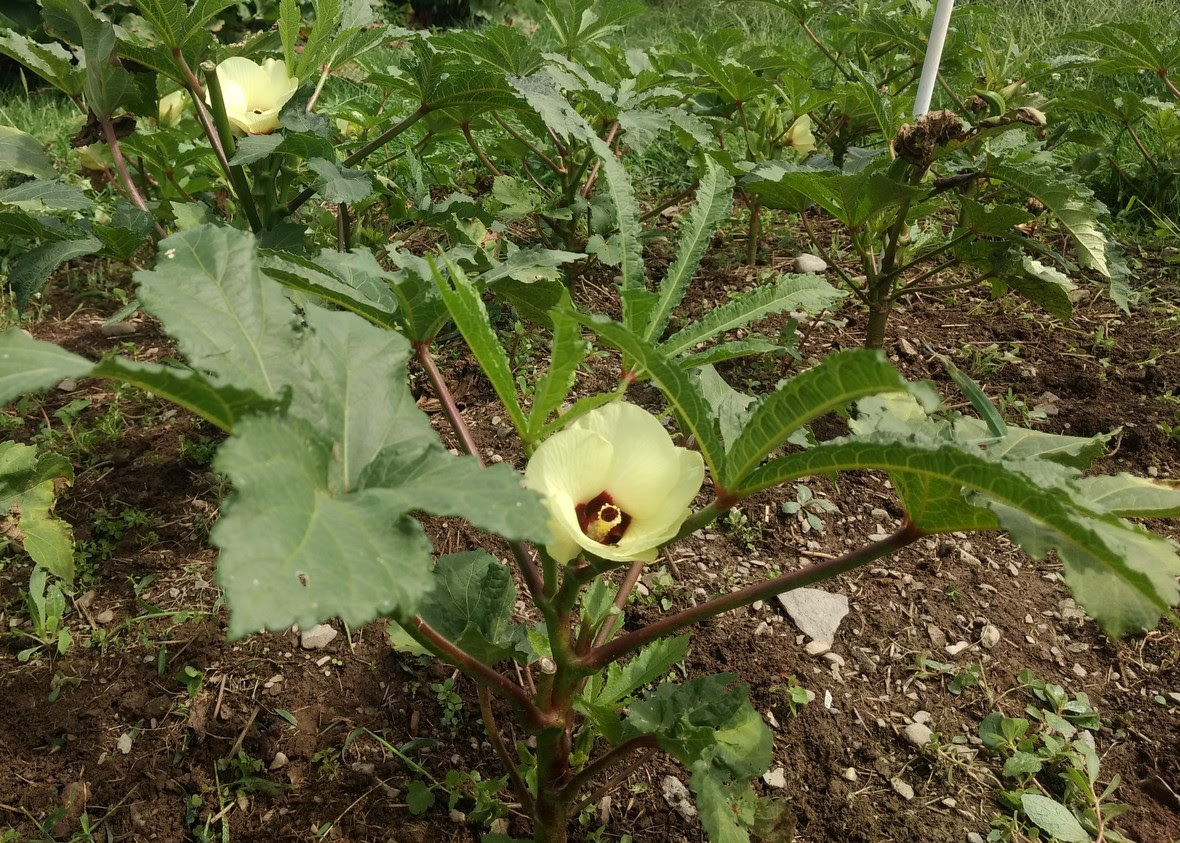
 The well weeded okra patch, photo by Mark Scherzer
The well weeded okra patch, photo by Mark Scherzer
| Order Amid Chaos Hi all, Mark here.When I reflect on why I find farming such a compelling activity, I always find myself returning to the insight I had after our very first season, two whole decades ago. The entire endeavor seems to me to center on trying to impose order on a chaotic world, on beating back the forces of nature that constantly threaten one’s schemes.Our carefully cultivated tomatoes grow where and how they want to grow, not necessarily in the regimented order we want them, such that I constantly see Victoria in the garden cutting back the rampantly growing side shoots. Sheep and turkeys have their own ideas about where to wander and graze no matter what pastures we designate for their use. Last year, when the turkeys were here, managing jail breaks was a daily routine. Ask Troy about the challenges of herding our Freedom Ranger chickens into safe pens at night.And even more challenging than managing our “cultivated” crops is battling the incursions of unintended guests. Weeds like amaranth spring up among the beans and within days of appearing seem to grow big enough to shade them out, while fast growing vines like bindweed and bittersweet twist around and choke whatever cultivar they can get their tendrils around. Invading pests, from groundhogs to rabbits, and predators from cabbage borers to hawks, kill and eat what we’ve carefully raised to kill and eat ourselves. Whatever romantic notions you may have that sustainable farms exist in harmony with the natural world around them, the truth is that the inhabitants of that natural world spend their lives scheming to take advantage of our labor and steal its fruits.In short, disorder threatens our productivity at every turn. On the small family farm, where there are so many simultaneous projects going on, the challenges of beating back these forces of chaos multiply. And in contrast to the 19th century farms on which our culture bases its small farm mythology, today’s small family farms come with small families too, never enough hands to do all the work that needs to get done. I find myself talking up the idea of marriage to Troy and Victoria. I’m not sure how much of my blunt nudging is because their relationship already seems so healthily married, and how much is because I think that commitment would enhance the likelihood of children, the helping hands they’ll need in the long term.You might think about children as agents of chaos but I can think of dozens of ways in which, properly trained, they could help bring order. One which has been occupying a lot of my attention of late is weeding.Nothing exemplifies the beating back of nature more vividly than the act of weeding. If I could choose a single task on the farm I’d be happy to do full time, every day, weeding would be it. In fact, weeding in my book beats most leisure time activities I can think of. Definitely ahead of word games on the phone. Unquestionably ahead of recreational shopping. Beats most movies. I’d say it’s nearly as much fun as cooking and eating with friends. Does it beat romance? Well, probably not, but let’s say weeding would be a great way to get down in the dirt together.And what do I like so much about weeding? It is doubly productive, because not only does it remove plants that threaten what we want to cultivate, but the weeds become feed for the chickens and enriches their eggs. Weeding is satisfying the way painting a room is satisfying, because I can so clearly see my progress and the contrast between before and after is so striking. And it is centering, because it requires enough attention to be mindful of what I’m pulling, but not so much as to interfere with thinking about things I really need to think about. Hence, a way to be alone in my head with my thoughts, a sort of meditative break from the rest of my life I don’t often get.But perhaps what is most satisfying about weeding is the way it undoes chaos and restores order. It puts things in their proper place. Sure, it is limited in scope to the little patch of wildness that has been beaten back, but that’s the patch I’ve focused on. To behold the weeded patch is have visual proof of the victory over the universal tendency to chaos.This is the time of year when some people abandon their gardens to the weeds. At the end of August, after a summer of continuous overabundant rain, it can be easy to simply surrender. But we keep on weeding. Why?In the ornamental gardens, the areas we’ve most neglected while priority has necessarily been given to productive farming activities, I am driven in part by guilt. I can only think how dismayed Peter, who devoted such efforts to building the gardens, would be at their appearance should he return. I therefore try whenever I can to at least keep the structure he planned apparent and the flowers in seasonal bloom visible.In the vegetable garden, we have to keep in mind that the next four to six weeks are perhaps the garden’s most productive time, and make sure to maximize our revenue for the lean season to come.But in a more fundamental sense, we simply cannot give up the battle against chaos. Our newly wet climate promotes natural chaos that farmers will have to continually combat, so this is no time to let down from a farm perspective. But it also feels like we are living in a society running amok, caused in no small part by a head of government who is a prince of disorder. Trade wars, broken alliances, culture wars, the war on science, racism, cronyism, corruption, the dismantling of government and shattering of civility. Chaos on so many fronts it sometimes seems impossible to bear.Except when I weed. And it centers me.Dr. Pangloss might say that all this chaos was created just so that I’d end up taking refuge, and solace, in weeding on the farm. I’m not sure that I’d say weeding makes everything right in the world. But it does make me feel better. |
| WHAT'S AVAILABLE THIS WEEKWild Water Peppers, $2/bunch Tomatoes, limited quantities, $3/lb. Sun Gold tomatoes $4/pint Lots of Rainbow Chard - $3/bunch Cucumbers, $2/lb Mugwort, $1/bunch for infusions or tea Beets, $4/bunch (mixed bunches Chiogga, Detroit Red, Golden, or tell us your preference), Scallions, $2/bunch Kale $3/bunch two different varieties, deep blue green straight leaf and curly leaf Collards, $3/bunch Wax beans and haricots verts $2.50/lb (limited quantities) SORREL, $2/BAG MINT: $.75 a bunch Greek globe basil, $3/basil DILL: sorry, between waves SHISO LEAVES green or red, $1.00 FOR 10 Basil, $2/bag Turkish pole beans, $3/lb (limited) Okra, $3'lb (limited)EGGS: $5/dozMEATS: We keep some on hand, but it helps to order ahead in case we need to retrieve from our stash in the big commercial freezerGEESE: One remaining, about 8.5 lbs. $10/lb.TURKEYS: A few small ones left over and frozen $11/lb .GUINEA FOWL, We are sold out!ROASTING CHICKENS - We are sold out til FallLAMB: shoulder roasts at $10/lb, riblets $8/lb, small and larger leg roasts $14/lb, lamb stew $7/lb, shanks, $10/lbPORK: Loin pork chops, $12/lb (2 to a pack, btwn 1 and 1.5 lbs), Jowl (roughly 2 to 3 lbs each), $12/lb, Spare ribs and country ribs $7/lb baby back ribs $8/lb fresh ham roasts (2 to 3 lbs), $12/lb picnic or Boston butt roasts (roughly 2 lbs) $12/lb smoked bacon, $12/lb Kielbasa $8/lbDUCKS: SOLD OUT |
| FARM PICKUPS:Email us your order at [email protected], and let us know when you'd like to pick up your order. It will be put out for you on the side screened porch of the farmhouse (110 Lasher Ave., Germantown) in a bag. You can leave cash or a check in the now famous pineapple on the porch table. Regular pickup times are Saturday and Sunday from 11 a.m. to 1 p.m. and 4 p.m. to 5 p.m., other days by arrangement. If you have questions, don't hesitate to call at 518-537-3815 or email. |

Turkana Farms, LLC, is a small scale producer of heritage breed livestock and a wide array of vegetables and berries on just over 39...

Hi everyone, Eric here. It has been 151 days since I relocated to Turkana Farms and 126 days since my last (and only) bulletin...

The prematurely warm, dry spring we’ve enjoyed, worrisome to farmers and gardeners as much of New York state has teetered on the edge of...